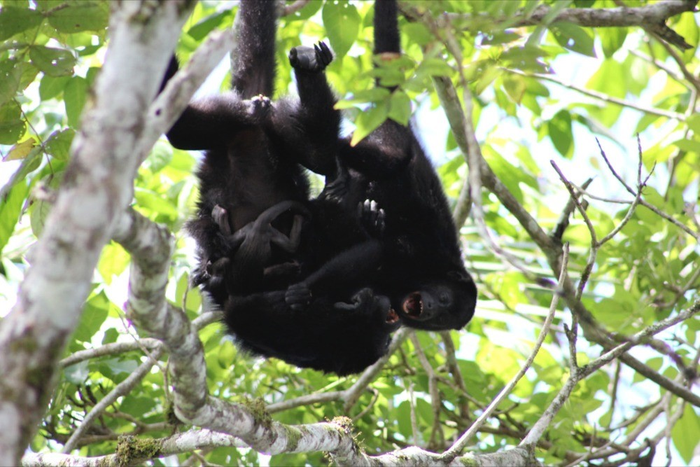Howler Monkeys play to avoid conflict and reduce group tension, study finds
Play among adult howler monkeys increases in line with time spent foraging for fruit, scientists say

Adult howler monkeys play to avoid conflict and reduce tension among group members, according to a new study which finds that the levels of play among the primates increase when they are faced with scarce resources.
The study, published on Wednesday in the journal Animal Behaviour, examined the activity of two howler monkey subspecies – the Mexican howler (Alouatta palliata mexicana) and the golden-mantled howler (Alouatta palliata palliata).
Researchers, including those from Anglia Ruskin University (ARU) in the UK, assessed how play activities among monkeys vary with age.
They also measured the amount of time adults play with other adults as well as with juvenile monkeys within their groups.
Play activities involve individuals hanging from their tails and making facial expressions and signals, such as shaking their heads.
However, scientists say play is an energy-costly activity for howler monkeys, who generally have an inactive lifestyle due to their primarily leaf-based diet.
These monkeys typically eat leaves as fruit is a highly prized resource that generates competition among the monkeys.
The study found that play among adults increases in line with time spent foraging for fruit.
Researchers said the amount of adult play is also linked to the number of potential playmates, increasing with the size of the group.
Adults spend more time playing with other adults rather than juveniles, while adult females spend more time engaged in play than adult males, the study noted.
Scientists said the finding was “striking” since female monkeys would be more vulnerable to food competition than males.
“Howler monkeys are a particularly energy-conservative species, and we would have assumed females would have played less, as they are also constrained by the energy requirements of reproduction,” study co-author Jacob Dunn from ARU said in a statement.
“Despite its appearance and our own perception of what play means, play is not always associated with frivolity or education. Instead, we think it fulfils an important function in howler monkey society by reducing tension when there is competition over scarce resources,” Dr Dunn said.
Scientists said howler monkeys do not have a fixed social hierarchy within their groups to navigate competition and conflict and, compared to other primates, they also do not engage in collective grooming for group cohesiveness and tension reduction.
Instead, researchers said play activities help howler monkeys regulate relationships within their social group and avoid conflict.
“One theory for the positive effect of fruit consumption on play is that a fruit-based diet simply provides the howler monkeys with more energy compared to their typical diet of leaves,” Norberto Asensio, another author of the study from Spain’s University of the Basque Country, said.
“However, if this was the case, we should have observed adults engaging in more play with all members of the group during fruit foraging, rather than just with other adults,” Dr Asensio added.
But since juveniles do not pose a threat or provide competition at fruit trees, scientists believe that play among adults is a mechanism for solving conflicts within the group, in a similar way that grooming is used by some other primate species.
“This finding, aside from being associated with more energy being available to engage in play, supports the hypothesis that play is a mechanism for solving conflicts associated with contest competition by either reducing social tension and/or fighting for a limited resource,” scientists wrote in the study.
Subscribe to Independent Premium to bookmark this article
Want to bookmark your favourite articles and stories to read or reference later? Start your Independent Premium subscription today.

Join our commenting forum
Join thought-provoking conversations, follow other Independent readers and see their replies